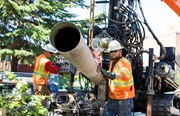5 Jobs in Environmental Services That Are in High Demand
By: Cascade EnvironmentalAccording to Environmental Business International, the environmental services industry generated $370 billion in revenues in 2016, representing nearly 3% of the US gross domestic product (GDP). This industry has remained relatively stable even during a global pandemic, and is positioned for continued growth. If you’ve been looking for a career path that will weather shifts in the job market and economy, environmental services may be just what you’ve been looking for.
If you’re not familiar with the industry, you may be surprised at the variety of careers available. In this blog post, we’ll highlight some of the most in-demand environmental services jobs.
If you’re already familiar with the industry and know you want to be a part of it, head over to our Careers hub and check out our current job openings.
DRILLER
Although there are training programs for those who wish to become drillers, most people learn the skills they need on the job. Depending on where you work or if you’re transporting equipment, however, you may also need certification. Some employers will pay those fees, such as for a CDL license, to ensure their workforce is qualified and knows that they’re valued.
Sr. Driller Mike Bond had this advice for those considering a drilling career: “It’s enjoyable, there’s great pay and plenty of work, but you must be willing to travel (and like it). Your spouse needs to be on board with that, too. You may spend a good amount of time away from them, and for some people that may be a dealbreaker.”
Read what it’s like to be a driller.
PROBE OPERATOR
Probe operators are professionals who run equipment that provides data about contaminants in the subsurface. These machines provide complex information that guide multi-million dollar projects—so it’s important everything is run and handled correctly to ensure accurate data. Like a drilling career, most of the skills you need are learned on-the-job thanks to experienced mentors.
Curious if this job would be a good fit? Probe Operator Cody Spiker advises, “If you want to get your hands dirty and stop talking and start fixing these environmental issues mankind has created in the last century, this is a good way to get started.”
Read what it’s like to be a probe operator.
TECHNICAL SPECIALIST
Technical specialists work on remediation projects, cleaning up contaminants that have made their way into the soil or groundwater. The skills needed for this role overlap with those of a driller and probe operator. Formal training isn’t required for this career path; instead, senior drillers, probe operators and technical specialists teach newcomers how to assess the site, use the machinery, and respond to a range of common challenges.
Technical Specialist Frank Egan said it’s hard to explain his job to people outside the industry: “I tell them we play with dirt and try to clean it up.”
Read what it’s like to be a technical specialist.
MECHANIC
In an industry that relies on so many pieces of heavy machinery, mechanics are in demand. Unlike some of the other roles described, mechanics in the environmental services industry are expected to already have a baseline of skill and experience. Many members of our team have studied at technical colleges or received formal training to become diesel engine mechanics, and then learned on the job about drill rigs, site characterization probes, injection equipment and other fleet assets.
“Our equipment is usually specialized machinery that you will likely not have prior experience working on. There’s a small learning curve, but our machines are very simple when broken down, and general mechanical knowledge and the chance to see how they work will make them easy to understand,” explained Sr. Mechanic Vinny Mesuda.
“If you can work on a car or truck, then you are not that far off from understanding our drill rigs.”
Read what it’s like to be a mechanic.
PROJECT MANAGER
There are many ways to build a career as a project manager, but what all project managers have in common is their ability to stay organized, clearly communicate, and understand and track complex processes. In the environmental services industry, project managers plan every detail of the project their teams will be working on. They make sure the right equipment and personnel are scheduled, necessary permits are acquired, and the work performed is within the original project scope, and everything is conducted on time and on budget.
If you’re wondering how you can work your way into such a role, Project Manager Annie Washington has great advice:
“I had no idea when I walked through the door as an administrative assistant that I would be in this position one day. I believe part of the reason may be that I never turned down any opportunity that was presented to me. With dedication and an open mind, you can achieve anything in any industry.”
Read what it’s like to be a project manager.
There are many jobs and roles within the environmental services industry, and these are just a few. If you’d like to learn more about what opportunities are available at Cascade, head to our Career hub to see our current openings.






